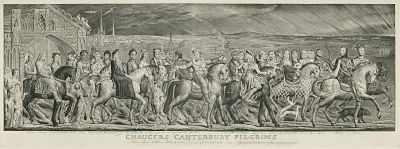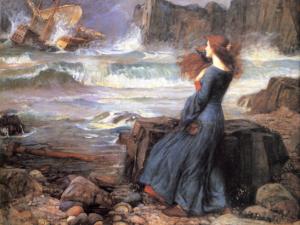 Chaucer did not wrote a book called Cranberry Tales despite what one of my students thought. Instead, he wrote Canterbury Tales, and then came to regret it. He said (translated from Middle English):
Chaucer did not wrote a book called Cranberry Tales despite what one of my students thought. Instead, he wrote Canterbury Tales, and then came to regret it. He said (translated from Middle English):
Now pray I to you all that hear this little treatise or read it, that if there be anything in it that likes them, that thereof they thank our Lord Jesus Christ, of whom proceedeth all wit and all goodness; and if there be anything that displeaseth them, I pray them also that they arette [impute] it to the default of mine unconning [unskilfulness], and not to my will, that would fain have said better if I had had conning; for the book saith, all that is written for our doctrine is written.*
This is like President Obama apologizing to God and us for his administration, Joss Whedon repudiating Buffy and the Avengers movies, and Donald Trump saying he was sorry to Rosie O’Donnell.
Chaucer is famous for Canterbury Tales to this day, yet worried about the morality of his work and his worry was reasonable. The tales he told are bawdy, not just earthy like Shakespeare. Chaucer let’s his pilgrims to Canterbury speak, they are real people, but at no point does he judge. Moderns rather like this, unless we are discussing Donald Trump. We judge not, lest our cool friends judge us.
Does great art justify decadence?
Chaucer was dying and he knew the answer: no. The artist facing the final judgement is right to worry if he has been clever at the expense of his soul. Romance, real love, is a human aspiration, but crudity, filth, can easily make romance unlikely. Doubt this? Say the wrong thing at dinner at the wrong time and you will find that romance dies!
Of course, Chaucer was not from our era where we are trying to separate the sexual from romantic. He lived in a time when marriage was divorced from romance. A man was more likely to love his mistress than his wife. Chaucer reported what was happening, but since he would not “judge,” he was worried people would not get his message.
Chaucer wasn’t a friend of immorality, he laughed at it, but it was not obvious he disapproved. When he was dying, he wanted clarity, because imminent death demands clarity.
I am told that college students now sleep together before the first date in order to avoid “mistakes.” This probably works in the same manner that suicide prevents many errors and sins. Dead men tell no tales and also do no further evil.
Chaucer knew that his “just the stories” approach could be misunderstood. He did not approve, but since he did not condemn (openly) many reader misunderstood.
Chaucer understood that the reasonable artist is responsible if the reasonable person misses the mark, because of this work.
God help us to be as brave as Chaucer!
———————
*Chaucer, Geoffrey (2008-09-02). The Canterbury Tales (mobi) (Kindle Locations 7952-7955). MobileReference. Kindle Edition.















